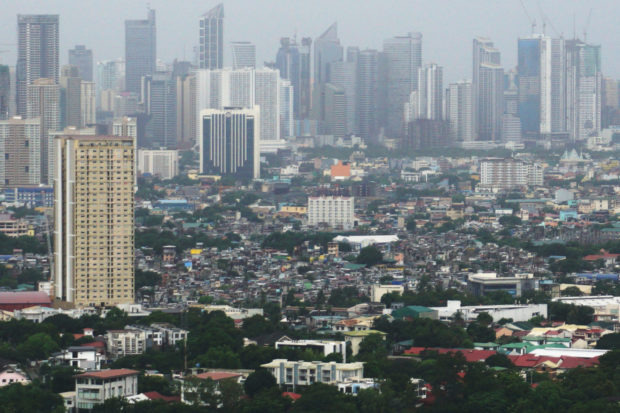House OKs bill making on-site relocation of informal settlers a first remedy

In this file photo taken on July 22, 2018, residential (L) and informal settlers (R) areas are pictured against the backdrop of Manila’s financial district of Makati. (Photo by TED ALJIBE / AFP)
MANILA, Philippines — A bill that aims to create on-site, in-city, near-city, or off-city resettlement programs for informal settler families (ISFs) was approved by the House of Representatives on its third and final reading on Monday.
A total of 254 lawmakers voted in favor of House Bill (HB) No. 5, which amends Republic Act No. 7279 or the Urban Development and Housing Act of 1992.
But this was not approved without Gabriela Rep. Arlene Brosas noting that her vote is not without reservations.
“Bagamat minamandato ng panukalang batas na ito na gawing first recourse ang on-site, near-city, at in-city resettlement program para sa ISFs, bigo ito sa pagtanggal ng anumang porma ng off-city relocation na naglalayo sa mga ISFs sa kanilang trabaho at kabuhayan,” she said, stressing that off-city resettlement for ISFs remain an option if on-site and in-city resettlements are not feasible.
(While this proposed law mandates that the first recourse should be on-site, near-city, in-site resettlement programs for ISFs, it fails to take out any form of off-city relocation which separates ISFs from their jobs and livelihood.)
Brosas cited HB No. 4087 filed by the Makabayan bloc, which makes on-site resettlement the first recourse and removes off-city resettlement among the options since, she said, this choice is most frequently implemented on the ground.
“Madali lang kasing sabihin na hindi kakayanin ang on-site development, na hindi pwede ang in-city at near-city resettlement, at ang natatanging option ay ilipat na naman sa malayong lugar ang maralita, malayo sa kanyang kabuhayan,” she pointed out.
(It’s easy to say on-site development, and in-city and near-city resettlement are not feasible and that the only option is to relocate the poor to places far from their livelihood.)
The Makabayan lawmaker further noted that HB No. 5 fails to eliminate the primary issue faced by most poor communities.
“At ito ay ang sunod-sunod na demolisyon sa mga komunidad upang magbigay daan sa mga imprastraktura na hindi naman mapakikinabangan ng mahihirap,” she said.
(And this is the continuous demolitions communities face to give way to infrastructures that do not benefit the poor.)
This, Brosas noted, was amended in Makabayan’s version of the bill, which intends to repeal Section 28 of the Urban Development and Housing Act of 1992 that establishes criteria for demolishing communities.
Despite these reservations, she still welcomed the proposed measure’s provision recognizing the rights of renters and sharers – particularly in the bill’s definition of terms.
“Isang mahalagang probisyon ang pagkilala sa mga karapatan ng tenants, sharers, at renters sa informal sector lalo’t nakakaranas sila ng diskriminasyon sa pagkuha ng government housing,” Brosas added.
(A necessary provision is the recognition of the right of tenants, sharers, and renters in the informal sector, especially as they experience discrimination in availing of government housing.)
She also called the provision on the creation of a People’s Plan – crafted through the cooperation of the beneficiaries and the local government units – “a huge step forward” as it can help raise and address the needs of the recipients of the resettlement program.
“Malaking bagay ito para sa mga maralita na sa karanasan ay basta-basta na lamang pinapaalis sa kanilang komunidad at tinatanggalan ng karapatan para sa pabahay,” Brosas further noted.
(This is a big deal because, for poor people, it’s a common experience to be kicked out of their communities and stripped of their rights to housing.)
On November 9, HB No. 5 hurdled the lower chamber on its second reading as Brosas and Northern Samar 1st District Rep. Paul Daza questioned the specific procedure in crafting the People’s Plan.
RELATED STORIES
House bill on on-site relocation of informal settlers approved on 2nd reading
House panel OKs bill authorizing on-site relocation of informal settlers































